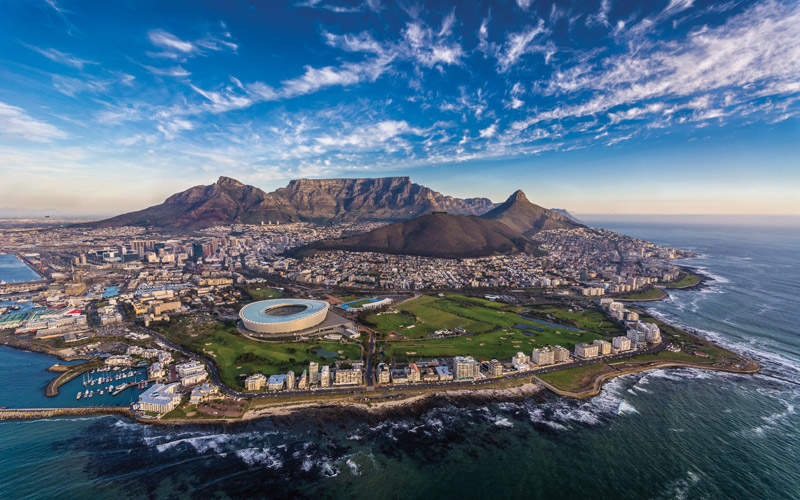The diamond showroom where you can polish your own stone




If Cape Town becomes the World Design Capital 2014
.. what would it mean for our city?
In June 2011 Cape Town was shortlisted for the World Design Capital 2014 out of 56 candidates. The Mother City is competing against Bilbao in Spain and Dublin in Ireland; the winner will be announced on 26 October 2011.
We talk to Bulelwa Makalima-Ngewana, the managing director of the Cape Town Partnership, the organisation mandated by the City of Cape Town to coordinate Cape Town’s World Design Capital 2014 bid.
If Cape Town becomes the World Design Capital 2014 – what would it mean for our city?
Our year as World Design Capital will see creatives from across the globe coming to Cape Town, learning, sharing, collaborating with our local – but no less world-class – talent. Who knows what innovations might come out of such collaboration? Think of the incredible international attention the 2010 FIFA World Cup brought; World Design Capital is like a year-long World Cup – but this time for the creative industry. And just as 2010 was an African World Cup, ours is a proudly African bid: World Design Capital 2014 is not just about our city, but also our continent. We’d like to showcase our proudly African design solutions.
The World Design Capital is a city promotion project by the International Council of Societies of Industrial Design to recognise and award accomplishments made by cities around the world in the field of design. What can Cape Town show off with?
Well, 2014 marks 20 years of democracy, and design is an important tool for transformation, helping us address the challenges of a history that divided us, and saw communities disempowered and disenfranchised. Think of IRT (Integrated Rapid Transport), and how it’s helping connect communities to each other and to opportunity – by bus, by car, by pedestrian- and cycle-friendly pathways. That’s empowering design. Think of Tsai Design Studio’s Nested Bunk Beds: In a 50m2 room, four of these beds can sleep 20 children, and still roll away during the day so the kids can play. That’s intelligent design. Think of Design Indaba’s 10x10 Low Cost Housing project, piloted in Freedom Park, which begins to address the massive housing shortage in Africa. There’s transformative design.
The key thing is initiatives to improve the quality of life, as well as help to improve the economy. How would this affect Cape Town?
How would improved quality of life and an improved economy benefit Cape Town? More jobs and more opportunities, healthier, happier people ready to take hold of those opportunities. And these kind of benefits in one area are bound to have a halo effect. We’d like the benefits to be seen country-wide, as all South Africa starts to shift its thinking and understand that design isn’t about making high-end consumer stuff, but creating a better future for all.
Past design capitals were Torino and Seoul – how did being World Design Capital influence these cities?
Being World Design Capital in 2010 saw Seoul move beyond putting economic growth first – to the detriment of quality of life – to becoming a more considerate, more liveable city. Take the Cheonggyecheon highway as an example of that change in mindset. Instead of simply replacing an ugly 1970s-style highway with another highway, they restored the river over which the highway had paved, making the most beautiful urban park in the centre of the city – at the same time reducing pollution, temperatures and traffic. Torino used the World Design Capital opportunity and momentum to reposition itself – abroad and at home – and so gain public and private support to continue working on design-led initiatives in the city. It also helped the city build better relationships with national and international design institutions.
What do our competitors Bilbao (Spain) and Dublin (Ireland) have that we don’t?
For starters, both our competitors are European – and in a way more established, more accessible, more familiar. They’re also more homogenous by nature. Isn’t it time the title came down south, and saw the diversity and vibrancy of Africa?
Once we’ve won, how is it going to work?
I like the confidence of this question: That’s the spirit! Even if we don’t win, we can’t lose – the process of bidding for World Design Capital itself has helped to shift our thinking on how to rebuild, reconnect and reposition Cape Town and the continent through intelligent design. And when we win, we’d like citizens to take charge, and make 2014 their year to shine.
by Antonia Heil
Why Cape Town should be named the World Design Capital in 2014
The Cape Town Partnership has asked that supporters 'make a designerly noise' in the run up to the final stages. A digital supporter button can be downloaded on www.capetown2014.co.za
For your monthly update on what’s happening in and around Cape Town, be sure to subscribe to our popular newsletter and follow us on Facebook and Twitter.







